Blog December 12, 2022
Abortion, Race, and Ethnicity

In the wake of the Dobbs decision overturning Roe v. Wade, significant attention has been given to the abortion views of men and women of various age groups. Less notice has been paid to the similarities and differences of racial and ethnic groups.
According to the Guttmacher Institute, women of color have significantly higher rates of unintended pregnancies and abortions than white women. The black abortion rate is highest, followed by Hispanics and whites. The August American Perspectives Survey (APS) shows that Blacks are more likely than Hispanics and whites to champion reproductive rights. The political contours of the issue, however, are less clear.
In the August APS, Black people were about 10 percentage points more likely (44 percent) than Hispanics (33 percent) or whites (34 percent) to say abortion should be legal under any circumstances. Among those who responded that abortion should be “legal under certain circumstances,” Black people (42 percent) were more likely than Hispanics (34 percent) or whites (38 percent) to say it should be legal most of the time. Black people (45 percent) were also more likely than Hispanics (37 percent) or whites (41 percent) to say the label pro-choice describes them very well. Black people, at 69 percent, were most likely to support employers providing assistance to employees traveling to another state in order to obtain an abortion if their state banned the procedure by about 10 percentage points. Fifty-nine percent of Hispanic people and 60 percent of white people voiced support for such actions. Of the three groups, Blacks (57 percent) were also much more likely than Hispanics (46 percent) and whites (33 percent) to say businesses and corporations should speak out publicly on abortion. Slightly less than half of each racial group supported churches and religious organizations speaking out on the issue.
Some of the questions in the August poll focused directly on the political impact of abortion policy. Perhaps surprisingly, attitudes were similar across racial differences. While roughly half of each racial group said that a candidate’s position on abortion would be one of many important factors in their vote, 22 percent of Blacks, 25 percent of Hispanics, and 26 percent of whites said they could only vote for a candidate who shared their view on the issue. There were only marginal differences among the three groups on whether abortion was a critical issue for them personally. Nationally, the increasing costs of housing and everyday expenses, crime, and gun policy proved to be the most highly ranked issues. Abortion ranked in the middle of the pack for whites and blacks, the fourth and fifth most important issue, respectively. However, Hispanics ranked abortion second to last, behind immigration, climate change, and school curricula. Despite ranking more issues as critical, just 20 percent of Blacks and 22 percent of Hispanics said they were following news about abortion laws and restrictions very closely, compared to 28 percent of whites.
The differences between races were smaller in regard to abortion’s morality and legality. Still, black people (12 percent) were slightly less likely than white people (15 percent) and Hispanic people (18 percent) to say abortion is “always morally wrong.” There were no real differences between racial groups at the other end of the spectrum: Blacks, Hispanics, and whites were nearly congruent in stating that abortion is “always morally acceptable” (15 percent, 15 percent, and 14 percent, respectively).
Blacks, whites, and Hispanics expressed similar views on whether or not abortion is a complicated or straightforward issue, with bare majorities describing it as complicated. Hispanics were only slightly more likely than Blacks to say that it is possible to compromise on the issue, 60 percent and 56 percent, respectively. 58 percent of whites responded accordingly.
As the dust settles after November’s midterm election, researchers are now able to look at the Dobbs decision’s impact on voters across the country. Hopefully, they will analyze the results along racial lines as well. Our research suggests that the answers aren’t straightforward.







